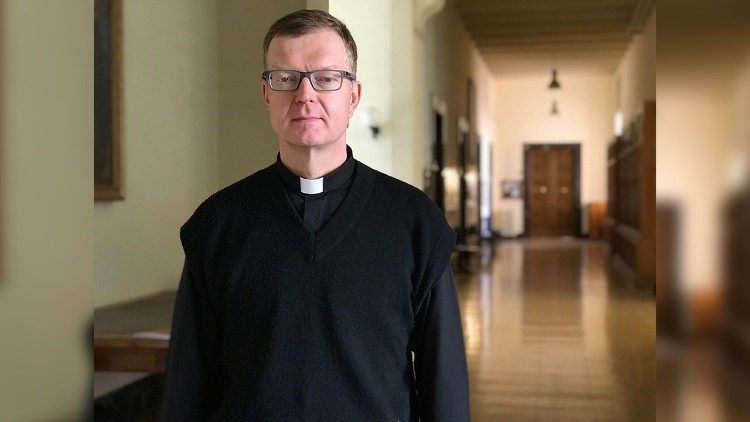WARSAW (POLAND)
Vatican News - Holy See [Vatican City]
September 18, 2021
By Devin Watkins
As a conference on safeguarding minors and vulnerable adults within the Church kicks off in Warsaw, Poland, Jesuit Father Hans Zollner describes the efforts already being made to protect the Church’s most vulnerable members.
The Pontifical Commission for the Protection of Minors is holding a conference to assist Church leaders in safeguarding her most vulnerable members.
The 4-day event, taking place from 19-22 September in the Polish capital of Warsaw, gathers Catholic representatives from across Central and Eastern Europe.
According to a consultant for the Pontifical Commission and one of the event’s organizers, the conference’s goal is to “show that the Church has to engage and commit in the protection of minors and other vulnerable people in any place or region of the world.”
Fr. Hans Zollner, SJ, the Director of the “Institute of Anthropology. Interdisciplinary Studies on Human Dignity and Care (IADC)” at the Pontifical Gregorian University, spoke to Vatican News about the Warsaw conference.
Special regional history
The Jesuit priest expressed his satisfaction that the Church in Central and Eastern Europe is hosting a major conference on safeguarding.
The region, he said, “has a special history, since the Churches there have been under siege for decades under the reign of communism, and there has certainly been some difficulties there in dealing openly with criticism, with wrongdoing, and with handling cases of abuse.”
Difficult topic to talk about
Fr. Zollner admitted that the topic of sexuality is one that many people in cultures throughout the world have difficulty discussing openly, even with close family members.
“People don’t feel very comfortable speaking about sexuality,” he said, “let alone sexual misbehavior, and let alone sexual misbehavior of authority figures like priests, religious, and other people within the Church.”
Central and Eastern Europe is not different in that regard, he added.
However, the region’s history sets an additional dampener on people’s ability to speak about and report abuse.
“The communists were certainly spying on people, and the Church was a stronghold of freedom,” said Fr. Zollner. “But, you could retain that freedom only if you didn’t really trust the authorities and law enforcement.”
Mistrust of the state
People who grew up in the Eastern Bloc knew they were “the enemy to the government and law enforcement”.
The justice system was not independent, and the media was inclined to enhance any stories about allegations of misconduct in the Church.
Another aspect that is often overlooked, according to Fr. Zollner, is that psychology and psychiatry were employed to punish those who opposed the communist government.
“They were sent to so-called ‘psychiatry clinics’, but sometimes they were just used to imprison people and to torture them.”
These many elements of repression led the people in Eastern and Central Europe to mistrust state authorities, the media, and psychiatry.
Steps forward
Fr. Zollner went on to say that the safeguarding conference in Warsaw is hoping to confront these challenges and set up a “Country Report”.
“We would expect each nation’s Bishops’ Conference to produce an annual report on their dealing with cases, the number of allegations, and the proceedings against those who have been accused.”
Several other nations around the world have already set up such annual reports, and the Commission for the Protection of Minors is hoping to see the Bishops in Eastern and Central Europe implement a similar mechanism.

Fr. Zollner pointed out that the “situation in every country is very different.” Some are majority Catholic countries, like Slovakia, Croatia, and Poland, while others have tiny Catholic minorities, such as Albania or Bulgaria.
These differences mean the financial and personnel resources available to local Churches vary widely across the region, as well as the cultural attitudes toward speaking out about sexuality and sexual abuse.
A long journey toward a change of mentality
Despite the wide range of situations facing the Church in Central and Eastern Europe, much has already been done regarding the protection of minors and vulnerable adults, according to Fr. Zollner.
“All the Bishops’ Conferences—to the best of my knowledge—have established their proper guidelines for dealing with cases and for promoting safeguarding,” he said.
One keynote address at the Warsaw conference will highlight the Catholic academic institutions which have begun to address the safeguarding of minors in their curricula.
Some of those universities are already offering courses on the topic, of which some are prepared in collaboration with the Institute of Anthropology, which Fr. Zollner heads up at the Pontifical Gregorian University.
Those offering safeguarding courses include the Catholic Universities in Ukraine at Lviv, in Croatia at Zagreb, and in Slovakia at Ružomberok.
Though much has been done, concluded Fr. Zollner, “we have to acknowledge that this will be a long journey, but there are already some people and institutions that are already working toward a change of mentality and for the implementation of effective measures against abuse.”
